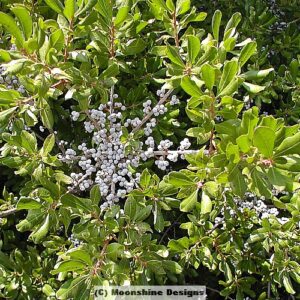
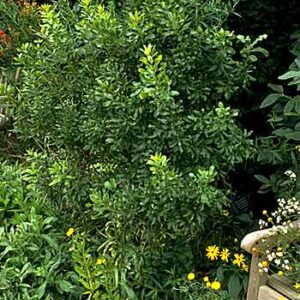
Bayberry, Northern
As a landscape plant, Bayberry is excellent for massing, borders or combining with broadleaf evergreens. It responds well to a periodic pruning to keep it’s form. An added advantage is that Bayberry has no serious insect or disease problems! Suited for Zones 2-9a.
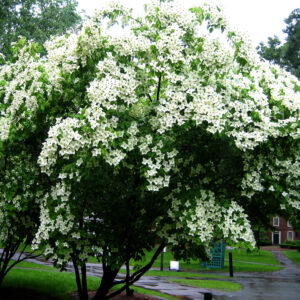
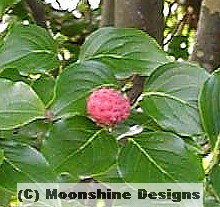
Dogwood, Kousa
Rounded shape with horizontal branching growing to about 20 feet at maturity.
Large, pointed, white to pinkish bracts produced three weeks after our native flowering dogwood. Fruits medium, reddish pink, raspberry-like, very attractive to birds. Foliage scarlet in fall.
CANNOT SHIP TO CA
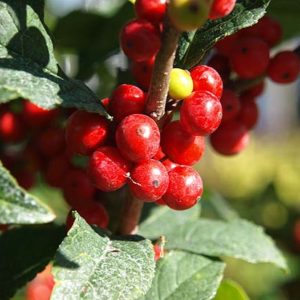
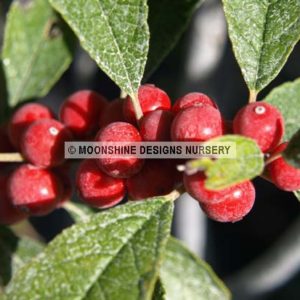
Holly, Winterberry, Afterglow
One of the best plants for fall and winter color.
Female plants produce bright red berries in profusion in early fall while leaves are still green and remain until mid-winter.
Berried stems often used in seasonal dried arrangements.
Likes acidic soil, will tolerate wet, swampy conditions.
Native to the northeastern United States.
Winterberry is dioecious, so both male and female plants are needed for fruit production.
Zone: 4-9
Height: 5-8 Feet
Spread: 5-8 Feet
Winterberry’s bright red berries provide color in winter after the leaves have fallen off. The plant grows in sun or partial shade and a rich, well- drained soil, although it tolerates swampy areas. The fruits are often eaten by birds. Also used at Christmas for decorations.
Use Jim Dandy as the male pollinator.
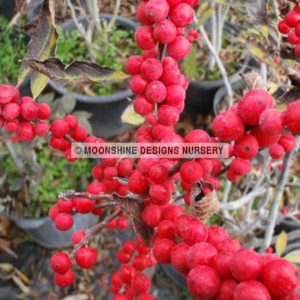
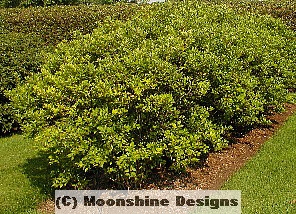
Holly, Winterberry, Berry Heavy
A spectacular winter show with its heavy set of large, bright red berries. This selection rivals all other winterberry selections for its sheer mass of fruit. Use Jim Dandy as the male.
Zone 4-7
6-8 feet
Full Sun to Partial Shade
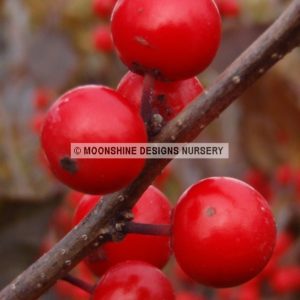

Holly, Winterberry, Berry Nice
BERRY NICE® Winterberry Holly
The dark red berry display is so vivid, the original plant was selected by sight at a distance of 1/4 mile. It’ll make you stop and take notice. Good clean foliage.
This lovely native is well adapted to wet soils, so it’s a perfect choice for near a pond or stream. The fruit appears in autumn and remains until early spring when the returning birds feast on the showy fruit. Berry Nice makes a great plant for cut arrangements. Planting a male selection in near proximity greatly improves the fruiting of Winterberry.


Holly, Winterberry, Jim Dandy Male
One of the best plants for fall and winter color.
Female plants produce bright red berries in profusion in early fall while leaves are still green and remain until mid-winter. This male variety is required for berry production on the females. Allow one male for every three females. Plants should be within 50′ of each other for best fruit set.
Berried stems often used in seasonal dried arrangements.
Likes acidic soil, will tolerate wet, swampy conditions.
Native to the northeastern United States.
Winterberry is dioecious, so both male and female plants are needed for fruit production.
Zone: 4-9
Height: 9 Feet
Spread: 9 Feet
May be pruned shorter.


Holly, Winterberry, Southern Gentleman Male
One of the best plants for fall and winter color.
Female plants produce bright red berries in profusion in early fall while leaves are still green and remain until mid-winter. This male variety is required for berry production on the females. Allow one male for every three females. Plants should be within 50′ of each other for best fruit set.
Berried stems often used in seasonal dried arrangements.
Likes acidic soil, will tolerate wet, swampy conditions.
Native to the northeastern United States.
Winterberry is dioecious, so both male and female plants are needed for fruit production.
Zone: 4-9
Height: 9 Feet
Spread: 9 Feet
May be pruned shorter.
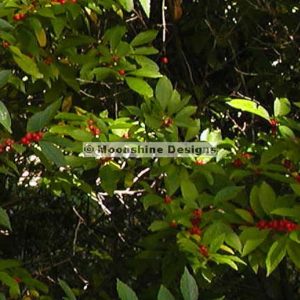
Holly, Winterberry, Sprite
One of the best plants for fall and winter color.
Female plants produce bright red berries in profusion in early fall while leaves are still green and remain until mid-winter. This male variety is required for berry production on the females. Allow one male for every three females. Plants should be within 50′ of each other for best fruit set. Use Southern Gentleman as the male.
Berried stems often used in seasonal dried arrangements.
Likes acidic soil, will tolerate wet, swampy conditions.
Native to the northeastern United States.
Winterberry is dioecious, so both male and female plants are needed for fruit production.
Zone: 4-9
Height: 3-4 Feet
Spread: 3-4 Feet
May be pruned shorter.
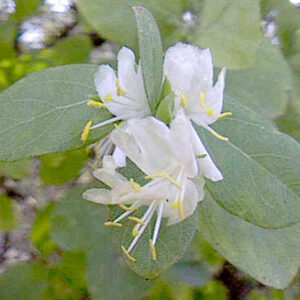
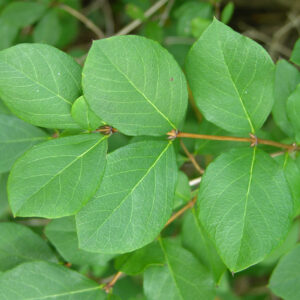
Honeysuckle, Fragrant (Winter)
Fragrant honeysuckle is a shrub that can appear to glow with very fragrant pink and white blossoms in spring. The fruit matures as red berries in early summer. An excellent shrub for wildlife and as an ornamental plant. Used mostly for screens or hedges, but also makes a fine specimen shrub. This shrub is self supporting and is not a vine.
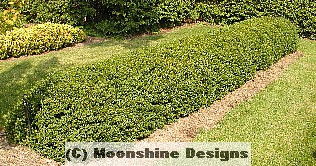
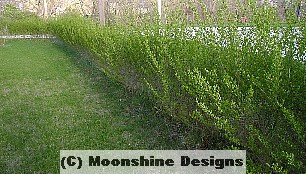
Privet, Amur River North
Container grown in Gallon pots. Superior to field grown plants……..Our container-grown plants have a denser and more branched root system. Shipped semi-bare root. 12-30″ tall & well branched.
Makes an excellent hedge! Can be kept pruned short or into shapes. Un-pruned plants may reach 15′
Hardy to Zone 3-7. Performs best in zones 3-6. Southern zones better suited for regular privet. Plant in full sun. Space 1-3 feet apart for hedge.


Privet, Amur River North Hardwood Cuttings
Lot of 100 unrooted hardwood cuttings 8-12″ long.
Makes an excellent hedge! Can be kept pruned short or into shapes. Un-pruned plants may reach 15′
Hardy to Zone 3-7. Performs best in zones 3-6. Southern zones better suited for regular privet. Plant in full sun. Space 1-3 feet apart for hedge.
CUTTINGS AVAILABLE NOVEMBER THRU MARCH ONLY


Privet, Common
Container grown in Gallon pots. Superior to field grown plants……..Our container-grown plants have a denser and more branched root system. Shipped semi-bare root. 12-30″ tall & well branched.
Makes an excellent hedge! Can be kept pruned short or into shapes. Un-pruned plants may reach 15′
Hardy to Zone 4-8. Performs best in zones 5-8. Northern zones better suited for Amur privet. Plant in full sun. Space 1-3 feet apart for hedge.
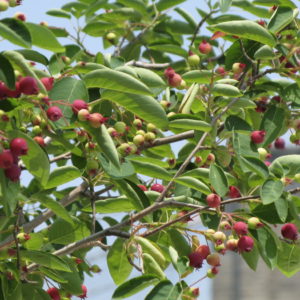
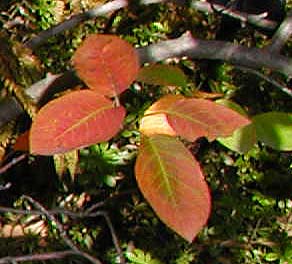
Serviceberry, Shadblow
A serviceberry cultivar from Ohio has beautiful white blossoms in spring and mildew-resistant summer foliage that changes to orange and then a brilliant red color in autumn. Best of all is its strong upright habit that makes it a good choice for screening/hedging. Highly resistant to rust and mildew.
Zones 4-8
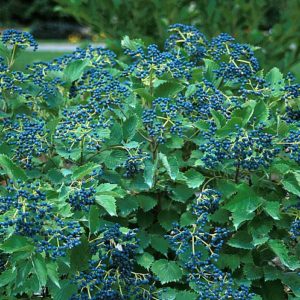
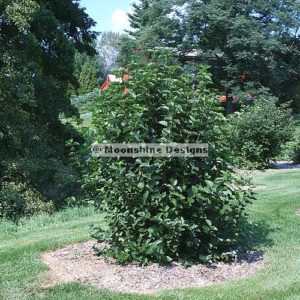
Viburnum, Blue Muffin™
A new compact selection of Arrowwood Viburnum! The perfect sized plant for residential landscapes. This compact beauty has loads of white spring flowers, and an impressive display of rich blue berries. Makes a great low hedge or foundation plant. Good container growing plant. Attracts songbirds. Berries are NOT edible.
The habit is dense and multistemmed with arching branches. The foliage is glossy dark green, fall colors are yellows, reds and purples.
Hardiness: USDA Zone 3-9
Size: 3 to 5 feet 3 to 4 feet wide
Exposure: Very adaptable! Full sun, partial shade or shade
Soil: Adaptable to many soils, moderate moisture
Uses: Not only is this plant showy, it’s very utilitarian. Use it as a small hedge, a foundation plant or on the edge of a woodland setting.
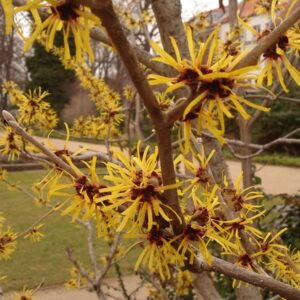

Witch Hazel
WITCH-HAZEL is the common name for Hamamelis virginica. The clusters of rich yellow flowers begin to expand in the autumn before the leaves fall and continue throughout the winter. Often blooms in winter!
Witch Hazel; small tree or shrub
